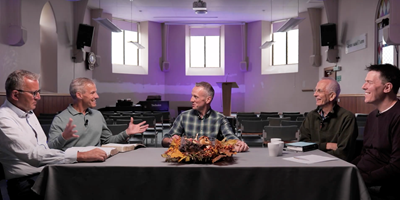The truth is, however, that Bible doctrine or teaching is actually the crucial basis for all practical application in our daily lives! Without sound teaching to ground our faith we are adrift, subject to the whim of our transient feelings, and unable to explain the reason for our beliefs. In order to be able to live a God-honouring life, we really need to know the principles taught in the Bible – that has to be the basis for our practice – and there is no quick-fix route to obtaining a firm understanding of it without spending serious time in God’s Word.
At the centre of the Bible, Christianity, and therefore each individual Christian’s life, must be Christ Himself, so it stands to reason that the surest way to live a fulfilled, fruitful Christian life, one that pleases Him in all aspects of daily living, is to increase our understanding and appreciation of who He is and our position in Him as believers. The doctrines relating to Christ are sweet, and precious, and completely astounding!
These truths give us both assurance and the tools we need for daily living, pursuing the goal God has for us all of being like Christ. In this article we will focus on one “assurance” truth and one resource available to help us in the pursuit of Christlikeness.
It’s so easy to get caught up in the whirlwind of life, focus on the present and all its frustrations, and end up going round in circles, never arriving at the place or the person we want to be. This is perfectly natural – we are human, we are frail, and God knows this – the Psalmist tells us that “as a father pities his children, so the Lord pities those who fear Him. For He knows our frame; He remembers we are dust” (Psalm 103:13-14). However, the Apostle Paul challenges us in his letter to the Colossians; “If then you were raised with Christ [if you are a born-again believer] . . . Set your mind on things above, not on things on the earth. For you died, and your life is hidden with Christ in God” (Colossians 3:1-3). This is a sublime statement because it is not suggesting that we should live with our heads in the clouds and neglect our earthly responsibilities, but it does indicate that we will approach those responsibilities and obligations with a different attitude – our motives and our strength will come from heaven, not earth.
The fact that as believers our lives are “hidden with Christ in God” conveys the safety and security of our position – once in Christ in Christ forever. What this means in practice is that, however far short of God’s standard we fall in our interactions with family, colleagues, friends, or in any other aspect of daily life, “nothing can separate us from the love of God” (Romans 8:38). This is not implying that we can wilfully go on making the same mistakes without any desire or effort to do better (nor will we want to do that if our minds are truly set on things above), but it does mean that we have one less thing to worry about – God will never abandon us. This wonderful truth brings comfort and confidence, and should allow us to focus on what we are and what we can do in Christ, rather than on what we are as fallible individuals.
One of the greatest resources we have as Christians is Christ in His role as our “Great High Priest” (Hebrews 4:14). The overwhelming theme of the letter to the Hebrews is the superiority of Christ to the system of Judaism which was laid out in the Old Testament. He is infinitely superior to those Old Testament high priests who were charged with the responsibility of being mediators between God and men in the centuries before Jesus Christ came into the world.
In the book of Leviticus we learn that the role of the high priest was to go into the holiest part of the tabernacle once a year and offer animal sacrifices on behalf of himself and the people of Israel, so that their sins would be forgiven for another year. The people themselves were not able to have direct communication with God, and the high priest had to go through a complicated rigmarole in order to be able to enter the presence of God. However, in Hebrews we learn that we have a “Great High Priest” who is “seated at the right hand of the throne of the Majesty in the heavens” (Hebrews 8:1). Our Great High Priest, having “offered one sacrifice for sins” (10:12) and entered “with His own blood” (9:12), is continually “in the presence of God for us” (9:24)! He has constant access to the Father!
That might sound very grand, but how does it affect us? In Hebrews chapter 4 verse 15 we have the most amazing double negative that makes this lofty truth incredibly relevant to us: “for we do not have a High Priest who cannot sympathize with our weaknesses, but was in all points tempted as we are, yet without sin”. He isn’t some out-of-touch, austere Being, who sits up there judging all our mistakes – no, He understands us perfectly, and He acts on our behalf. He is able to do this because He was born as a human baby, lived as a man on this earth, and experienced all the temptations that we face. The huge difference with Him was that as God He was incapable of sinning, but this does not take away from His ability to understand the pressures that we face, because He was also a man.
Hebrews 4 goes on to say that we can therefore “come boldly to the throne of grace, that we may obtain mercy and find grace to help in time of need”. That is a precious statement. We can come to God “boldly”, not with fear that He won’t hear us or won’t care or will be angry with us. Why? Because it’s the “throne of grace”, and what we can expect to find there is mercy – the withholding of that which we deserve – and grace – the generous gift of what we do not deserve. We can come even without words, for Christ is able to take our groanings (Romans 8:26-27) when we don’t know what to say or how to say it, and present those to the Father who has compassion on His children. If you stop and think about the reality of this, it’s absolutely astounding! We have free and unlimited access to the almighty God of the universe through the One who died for us as individuals, knows every minute detail about us, and still loves us beyond measure! That’s the resource we have! That’s the power we have that makes it possible to live the Christian life!
Without a Great High Priest interceding for us minute by minute we would likely flounder and drown. We might be discouraged and downhearted by our own failings; feel worthless and useless, and miss out on the deep-seated joy and peace that our position in Christ should cause us to experience. But with His constant interceding on our behalf before a loving Father, we can triumph. In the words of the beautiful doxology at the end of Jude’s epistle, “Now to Him who is able to keep you from stumbling, and to present you faultless before the presence of His glory with exceeding joy, to God our Saviour, who alone is wise, be glory and majesty, dominion and power, both now and forever. Amen” (Jude:24-25).





































